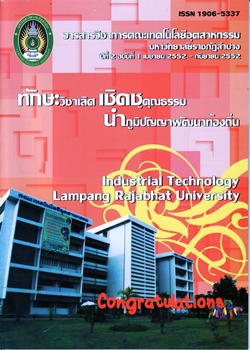ปัจจัยที่มีอิทธิพลต่อการลงทุนด้านอุตสาหกรรมผลิตไฟฟ้าในสาธารณรัฐประชาธิปไตยประชาชนลาว
Keywords:
ปััจจัยที่มีอิทธิพลต่อการตัดสินใจในการลงทุนด้านผลิตไฟฟ้า, ผู้ประกอบการผลิตไฟฟ้า, factor influencing power generation investment, power generating entrepreneursAbstract
-
Factors Influencing Power Generation Investment in Lao People’s Democratic Republic
This paper aims to study factors influencing investment in power generation by Thai businesses. The study focuses on one hundred and one power generating companies comprised of very small power producers, small power producers, and independent power producers. Investment is through joint ventures, mixed ventures, wholly owned enterprises, and portfolio investment. Research was conducted using closed and openended questionnaires; variable measures; statistical factor analysis; and binary logistic regression. The study reveals two main factors influencing investment decisions: physical and societal factors, and factors stemming from the business environment.Physical and societal factors are sub-divided into five minor factors relating to political, legal, economic, geographical, and cultural factors. Business environment factors are sub-divided into price advantage, marketing advantage, advantages in innovation, number and comparative capabilities of competitors, and national competitive differences.
In terms of physical and societal factors, the research shows that the most influential issues affecting investment decisions are legal, namely that the government of Lao PDR has issued laws assuring foreign capitalists of rights regarding the repatriation of capital and dividends. Moreover, the Laos government has enacted laws concerning tax exemption or waivers relating to project construction, infrastructure, and certain industrial activities which involve the use of modern technology. Additionally, laws providing for tax exemption when importing machines, tools, spare parts, vehicles, and raw materials that are unavailable or inadequate in the country have also been issued. The second factor positively affecting investment decisions is the cultural continuity between Lao PDR and Thailand. The similarity between Laotian and Thai north-eastern dialects provides for a direct means of communication, obviating the need for an interpreter. Geographical influences are a third factor; dense forests cover the northern and eastern areas with plentiful water throughout the year.
Referring to factors categorized under the business environment, the most influential factor is advantages originating in technology and innovation, followed by national competitive differences. Unlike complicated coal-fired or other thermal power plants, electricity produced using hydropower is simple and clean. The large amount of water contained throughout the year in mountainous locations in Lao PDR enables the construction of dams to generate a great deal of electricity, when compared to Thailand, Cambodia and Vietnam, to which in exports significant quantities of energy. Price advantages are a second factor. The price of electricity, generated by entrepreneurs in Lao PDR and sold to EGAT has a low cost due to the low fixed cost of hydropower. The third factor is a major advantage in marketing. Power demand in Thailand, China, and Vietnam will be three-times higher in the next ten years, providing extensive business opportunities in the market for electricity.






